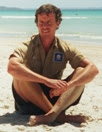THE IN BETWEENERS
Yesterday it was Rachel Carson's 100th birthday. Although she died in the early 60's she's often credited with creating and inspiring the modern environmental movement. That is of course a very eurocentric way of looking at "the environment", but Carson's writing emphasised that our urban biased "command and control" attitude towards nature had us up to our elbows in the proverbial.
That is of course a very eurocentric way of looking at "the environment", but Carson's writing emphasised that our urban biased "command and control" attitude towards nature had us up to our elbows in the proverbial.
Silent Spring was published in 1962. USA's proverbial was DDT and Carson spelt out its impact in breathtaking detail. One of her prime observations was of urban DDT use to control tree insects, and the gradual residue buildup in our ecosystem.
Our very presence between the forests and grasslands, and the waterways on which our dominant economic model relies is a strange no-mans-land. Marston Bates wrote a brilliant book about the same time as Carson. The Forest and The Sea emphasised the symbiotic relationship of the two, and it is especially in that context that our beloved production system is typically nothing short of "in the way".
The two main nature old timers were Henry David Thoreau and a century later later Ralph Waldo Emerson. Way back in 1854 Thoreau wrote the magical not-too-wilderness account of Walden pond. Thoreau's was a position of observation. So too Emerson's A Sand County Almanac. A lay person in someone elses patch.
Carson and Bates were largely observational but with a little more analysis (they were after all scientists). They had the luxury of observation when our urban presence was perhaps most aggressive.
It was appropriate then that I caught Planet Earth last night on Prime. Rich, rich observation and even richer imagery. In no way does this detract from analysis of the seemingly simple but amazingly complex system that is our biosphere.
It seemed to me a perfect way to end Carson's birthday, and of course to reflect that our in between-ness requires a whole lot more respect of the planet than we generally show.
Some advice: catch Planet Earth next Sunday on Prime...






